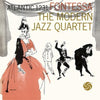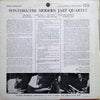



The Modern Jazz Quartet - Fontessa
John Lewis (piano)
Milt Jackson (vibraharp) [click here to see more vinyl featuring Milt Jackson]
Percy Heath (double bass)
Connie Kay ( drums)
Writen by John Lewis (A1, A3), Earl Brent (A2), Matt Dennis (A2), Harold Arlen (B1), E.Y. "Yip" Harburg (B1), Milt Jackson (B2), Ann Ronell (B4), Dizzy Gillespie (B4)
1 LP, standard sleeve
Original analog Master tape : YES
Heavy Press : 180g
Record color : black
Speed : 33 RPM
Size : 12'’
Stereo
Studio
Record Press : Pallas
Label : Speakers Corner
Original Label : Atlantic
Recording: January and February 1956 by Rudy Van Gelder in mono
Production: Nesuhi Ertegun
Originally released in 1956
Reissued in 2017
Tracks :
Side A :
- Versailles (Porte De Versailles)
- Angel Eyes
- Fontessa
Side B :
- Over The Rainbow
- Bluesology
- Willow Weep For Me
- Woodyn You
Reviews :
« This LP has a particularly strong all-around set by the Modern Jazz Quartet. While John Lewis' "Versailles" and an 11-minute "Fontessa" show the seriousness of the group (and the influence of Western classical music), other pieces (such as "Bluesology," "Woody 'N You" and a pair of ballads) look toward the group's roots in bop and permit the band to swing hard. » AllMusic Review by Scott Yanow
« As members of Dizzy Gillespie’s big band, John Lewis and Milt Jackson were establishing a reputation as premier jazz instrumentalists. John Lewis was revered for his inclination toward classical music and its organic integration with jazz. Milt Jackson was a fierce instrumentalist, inspired by bebop. After forming the John Lewis Quartet in 1952, the beginning of a four-decade prominence on the jazz scene was launched. Eventually, the “final” lineup was established with the addition of Percy Heath and Connie Kay. Under the name Modern Jazz Quartet, the ensemble were adept at recording their own albums (on various labels) and collaborating with a variety of jazz icons (Ben Webster, Jimmy Giuffre, Oscar Peterson, Sonny Rollins), Their ability to master improvisation and polyphony was unprecedented. They were adept at restrained, but inspired instrumental jams. Their earliest successes, “Django” and “Bags Groove” have become jazz standards. The Modern Jazz Quartet enjoyed various resurgences throughout their illustrious career, but they were at a creative apex in the 50’s with their catalog on Verve and Atlantic.
Speakers Corner has released a re-mastering of Fontessa, (Atlantic/1956). The original recording was engineered by Rudy Van Gelder and John Kraus. Their grasp of mono aural landscapes is superb and the vinyl re-mastering is faithful to the hi-frequency “roll-off” that defined that sound. Side One opens with a Lewis composition, “Versailles”. With a triangle for percussion, Lewis and Jackson play together and intermingle on the melody. The dual-pronged translation mirrors the distinctive, contrasting styles of Lewis (precise, serious) and Jackson (improvisational, bluesy). Heath’s understated double bass fits in perfectly. Perhaps the unique artistry of MJQ is best represented by the ruminative cover of “Angel Eyes”. With a single-note underlying vibraharp and triangle, Lewis executes his graceful, but complex piano notations. The melodic context has a sultry cinematic resonance. Lewis’ poignancy complements Jackson’s energetic be-bop phrasing.
Always celebrating interpretive range, the title track is visionary. Fortunately, Lewis (the composer) has provided context to this “suite” in the liner notes. Lewis and Jackson combine on a classical-infused prelude (with deft cymbals). The first “movement” is vampy with blues imagery. There are unusual chords and musical structures folded into a medium-swing cool jazz groove. The next part is more improvisational as both Jackson and Lewis (with a surprising gospel flavor) sustain lyrical flashes against a loping bass rhythm. The final segment is more contemporary with edginess and spare dissonance. Kay executes a rare cymbal solo. Side B is loaded with different arrangements. Everyone is familiar with Harold Arlen’s “Over The Rainbow”. Jazz musicians have always been drawn to this piece for its haunting, emotional melody. Lewis delivers a silky intro before he is joined by Milt on the patented dual lead with counterpoint. The physical dexterity of the vibraphone performance is dynamic and explosive. There is a quasi-bounce temp change, before the two soloists combine on a simple, but gorgeous harmony.
“Bluesology” (written by Milt Jackson) is an accomplished concoction of swinging jazz blues. Milt percolates on vibraharp, while John lats down soulful riffs. The overall sound is fuller, almost like a 4-piece big band. In a switch, Lewis shines with improvisational acuity on an extended solo with sprightly chords and soulful inflection. Jackson finishes the jam and the band executes another tempo change at the end. “Willow Weep For Me” is a change of pace with a moody late-night balladry. Again, Lewis can integrate with the rhythm section and layer counterpoint simultaneously. There is a slight rhythm up tick, before the return to bluesy rumination. The finale (“Woodyn You”) is homage to the group’s mentor, Dizzy Gillespie. As advertised it is a polyrhythmic bebop arrangement with syncopation, stops and big time swing flourishes. The amazing coherency of contrasting instrumentalists is intriguing and compelling. Jackson rollicking riffs and Lewis’ understated play merge seamlessly.
The overall sound mix of Speakers Corner’s vinyl re-mastering is excellent. The mono fidelity is crystalline. The listener can differentiate each individual instrument at all times. The mic placement is brilliant, as evidenced by the precise rendering of minor details like a cymbal or triangle. The vibraphone tonality is crisp and sharp, but also glows with echo. There are band notes (from the Atlantic album) by renowned critic Ralph J. Gleason (San Francisco Chronicle, Down Beat).
Fontessa is a jazz classic, made greater by a technology update! » Robbie Gerson, Audiophile Audition, Apr 11, 2018
The famous critic and jazz expert Ralph J. Gleason quite rightly mentioned two highly distinctive men in his liner notes – John Donne and Pablo Picasso. Almost four hundred years and a great deal of seawater separate the two exceptional artists from England and Spain. Nevertheless the four black US-Americans who make up the Modern Jazz Quartet bridge the gap between time and continents effortlessly.
And what’s more, blues is also to be heard – and bebop! And evergreens from the Broadway shows of the Thirties too!
In contrast to some of the other rather more dawdling and laid-back MJQ LPs, "Fontessa" offers diversified and intense music. Nothing is routine, perhaps because the drummer Connie Kay had replaced Kenny Clark just one year previously. But maybe too because Milt Jackson’s blues influence inspired John Lewis perceptibly to forget all about discipline. All seven numbers are true gems. But if you want a special hint, just listen to "Bluesology". Well, perhaps the present author is too much of a Milt Jackson fan. Be that as it may, the music magazine "Rolling Stone" gave this LP a five-star rating!
Ratings :
AllMusic : 4.5 / 5 , Discogs : Rate Your Music :


